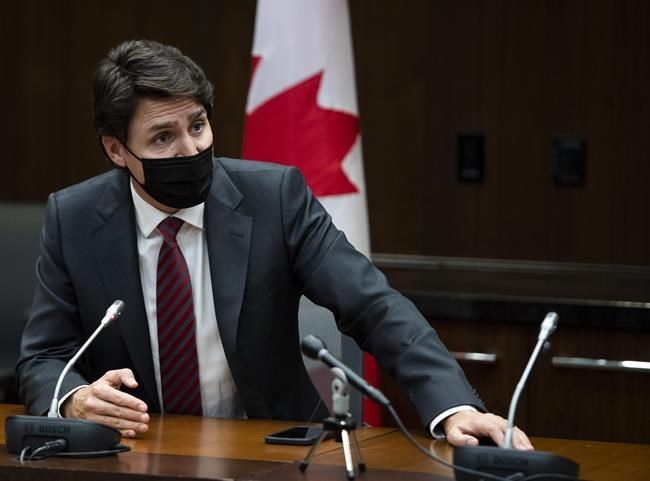OTTAWA — The federal government has temporarily expanded eligibility for two COVID-19 benefit programs to aid those affected by measures imposed in response to the spread of the Omicron variant.
Prime Minister Justin Trudeau made the announcement Wednesday as provinces tighten restrictions on businesses in response to a countrywide surge of COVID-19 cases.
"We're going to be there for the hardest hit regions, for specific sectors like art and culture, hospitality, and tourism," Trudeau said during a virtual news conference.
"We will be there to keep you and your family safe."
Last week Parliament passed the new Canada Worker Lockdown Benefit, a program that grants $300 a week to anyone who can't work because of a COVID-19 lockdown.
The law also includes targeted aid for businesses that are ordered closed as part of a local lockdown.
The government defined a lockdown to be when a health authority orders non-essential businesses closed and non-essential workers to stay home.
As a result, no part of the country was officially in lockdown, leaving those benefits out of reach for people even as businesses shut their doors and workers are sent home.
"We are announcing our decision to temporarily expand the definition of a lockdown so that these wage and rent support programs can support workers and businesses that see capacity restricted by 50 per cent or more," Finance Minister Chrystia Freeland said at the briefing.
The temporary policy will apply from Dec. 19 to Feb. 12.
Omicron is now the dominant variant in several provinces, prompting the closure of businesses and tight restrictions on capacity limits on many more.
Just before midnight tonight, bars, nightclubs, gyms, fitness centres, and dance studios in B.C. must close.
Starting Friday, Alberta is limiting venues that seat more than 1,000 people, including arenas, to half capacity.
Prince Edward Island has joined Newfoundland and Labrador in requiring visitors to isolate upon arrival in the province.
Quebec reported a record number of cases for the third day in a row, with the Omicron variant accounting for nearly 80 per cent of the 5,043 new infections.
Later Wednesday, Quebec Premier François Legault is expected to announce some “difficult choices” in response to the rapid spread of Omicron in the province.
Quebec Public Security Minister Genevieve Guilbault said she has asked Ottawa for military help to accelerate the province's mass vaccination campaign.
Federal Emergency Preparedness Minister Bill Blair has said the rising case counts in Quebec and across Canada are deeply concerning and the federal government will work with the province.
Despite projections that Omicron-driven cases and hospitalizations will increase dramatically by the end of the month without stronger interventions, Saskatchewan is not planning to tighten public-health measures for the holidays.
Meanwhile Ontario is investigating complaints of businesses or individuals reselling rapid antigen COVID-19 tests, with anyone caught doing so facing steep fines, and several hospitals have introduced stricter visitor policies.
This report by The Canadian Press was first published Dec. 22, 2021.
Laura Osman, The Canadian Press



